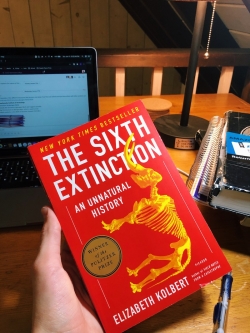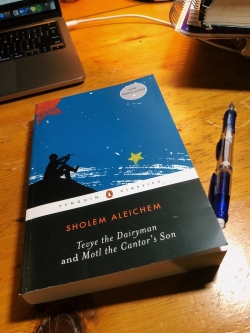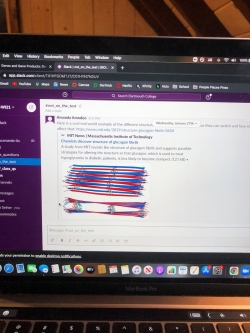
A Tour Through My 21W Courses
One of my favorite parts about Dartmouth—especially when taking introductory classes—is how excited professors are about relating their disciplines to students; you can tell that they're making sure that regardless of their major or academic interests, students are able to engage with and enjoy their material. One of the ways professors do this is by assigning or providing digestible sources of information: whether extra or part of the syllabus. In each of my three classes, my professors have given us so many easy-to-interact-with resources to further our knowledge. I'll walk you guys through these communication channels and books, in the process telling you a bit about each of my classes.
"The Sixth Extinction: An Unnatural History" by Elizabeth Kolbert

In Evolution of Earth and Life (EARS 2), we read this book as part of our discussion on mass extinction events. This super interesting book was super informative and also really cool, especially since I usually don't read science books. EARS 2 really focuses on how the physical processes of the planet allow for life and this book really dives into that idea, discussing the current extinction event from both an ecological and geologic perspective. This book really woke me up to the magnitude of human-caused environmental damage but also taught me a lot about geological and fossil history.
"Tevye the Dairyman and Motl the Cantor's Son" by Sholem Aleichem

As my first-year seminar, I decided to take Jewish Culture and New York (JWST 7), which has been really cool for a number of reasons. Before the class, I never really examined Yiddish literature and culture and it's been really fun to explore a whole host of profoundly important works. Recently, we read "Motl the Cantor's Son" by Sholem Aleichem, but—given a variety of resources about Sholem Aleichem and his life—and upon learning that "Fiddler on the Roof" is based on "Tevye the Dairyman," I decided to read it and I feels great to have so much access to Yiddish literature, a subject I never really considered before. In the first-year seminar, we discuss narratives about Jewish immigration to New York during the 19th and 20th centuries, touching on a variety of topics like traditional Jewish family structure, the idea of assimilation into modernity from Eastern Europe, and the interactions between antisemitism and racism.
#Not_On_The_Test Slack Channel

While Gene Expression and Inheritance (BIOL 13) has no assigned readings beyond the textbook, my professors decided to start a webpage dedicated exclusively to interesting articles related to the material we've been studying. For example, a couple of days ago we were studying protein structure and—after class—our professor uploaded an article about alternative proteins shapes for students who wanted extra information. While this class has been really intense, I really love the content and learning about recent discoveries in the field through a curated slack channel helps keep me motivated and excited about biology.


















